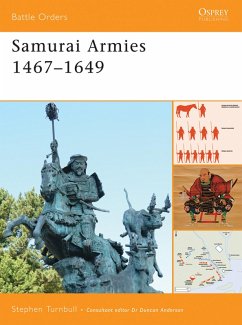
Lost Samurai (eBook, ePUB)
Japanese Mercenaries in South East Asia, 1593-1688

PAYBACK Punkte
2 °P sammeln!
"An inherently fascinating, impressively well written, exceptionally informative, and meticulously detailed history" of Japanese overseas mercenaries ( Midwest Book Review). The Lost Samuraireveals the greatest untold story of Japan's legendary warrior class, which is that for almost a hundred years Japanese samurai were employed as mercenaries in the service of the kings of Siam, Cambodia, Burma, Spain and Portugal, as well as by the directors of the Dutch East India Company. The Japanese samurai were used in dramatic assault parties, as royal bodyguards, as staunch garrisons and as willing e...
"An inherently fascinating, impressively well written, exceptionally informative, and meticulously detailed history" of Japanese overseas mercenaries ( Midwest Book Review). The Lost Samuraireveals the greatest untold story of Japan's legendary warrior class, which is that for almost a hundred years Japanese samurai were employed as mercenaries in the service of the kings of Siam, Cambodia, Burma, Spain and Portugal, as well as by the directors of the Dutch East India Company. The Japanese samurai were used in dramatic assault parties, as royal bodyguards, as staunch garrisons and as willing executioners. As a result, a stereotypical image of the fierce Japanese warrior developed that had a profound influence on the way they were regarded by their employers. While the Southeast Asian kings tended to employ samurai on a long-term basis as palace guards, their European employers usually hired them on a temporary basis for specific campaigns. Also, whereas the Southeast Asian monarchs tended to trust their well-established units of Japanese mercenaries, the Europeans, while admiring them, also feared them. In every European example a progressive shift in attitude may be discerned from initial enthusiasm to great suspicion that the Japanese might one day turn against them, as illustrated by the long-standing Spanish fear of an invasion of the Philippines by Japan accompanied by a local uprising. During the 1630s, when Japan chose isolation rather than engagement with Southeast Asia, it left these fierce mercenaries stranded in distant countries never to return: lost samurai indeed!
Dieser Download kann aus rechtlichen Gründen nur mit Rechnungsadresse in A, B, BG, CY, CZ, D, DK, EW, E, FIN, F, GR, HR, H, IRL, I, LT, L, LR, M, NL, PL, P, R, S, SLO, SK ausgeliefert werden.













